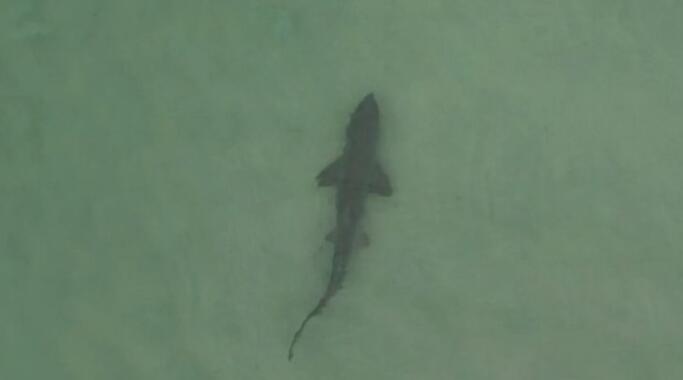The head and tail of a shark believed to be rarely seen in British waters were cut off after the animal was found dead on a beach.
The incident prompted broadcaster and popular historian Dan Snow to appeal for the head to be returned so scientists can study it, the BBC reports.
Walkers at on Lepe beach in Hampshire, southern England, last Saturday discovered a dead shark.
READ MORE: Shark chases New Zealand swimmers to steps of beach access

But it was later spotted without its head, tail and fin, believed to have been removed under the cover of darkness.
Later, Snow and a group of local residents dragged the 2.4m shark from the beach to a nearby road to secure the carcass.
He tweeted a video showing their efforts but said “trophy hunters” had reached it first.
“We have recovered a good chunk of it but some trophy-hunters got there just before us and they took the head and the dorsal fin on the tail,” he said.
We went to secure the shark for science last night. But we were too late!
Please please- of you have the head get in touch. The scientists want to have a look at it and then it’s yours to keep. https://t.co/gS8SYQxAp4— Dan Snow (@thehistoryguy) March 19, 2023
Snow said he and the group had been requested by scientists to safeguard the carcass “of this once-in-a-lifetime find in British waters”.
From images on social media, the shark was identified as a smalltooth sandtiger by the UK Shark Trust.
“Smalltooth Sandtigers are seldom encountered and considered naturally rare. In the Northeast Atlantic their range reaches to the French coast at the top of the Bay of Biscay. Making this report an exceptional one,” the trust said in a statement.
“The head in particular holds the key to unlocking intricate details of the shark’s life, even from before birth, so we’d welcome news of its whereabouts.”
Snow also appealed on Twitter for the return of the shark head.
READ MORE: Cold change hits after heatwave sees March records tumble

He said scientists who contacted him wanted to study it to “help us learn about our oceans and the ocean health and climate change”.
Ben Garrod, a professor in evolutionary biology at University of East Anglia, said it was important for scientists to examine the shark as it offered a “snapshot” of animals living in international waters.
“The oceans cover 71 or 72 per cent of our planet, however it’s still incredibly mysterious,” he told the BBC.
“Every time we see a whale breaching or a shark washing up, this is like finding a Roman hoard or Viking daggers.”



